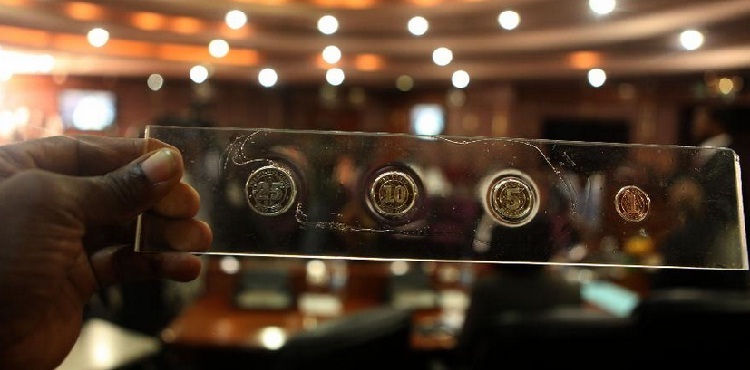
The Sunday Mail

Clemence Machadu Insight —
Howdy folks! The day after tomorrow is November, that month of the goat which is apparently bringing lots of great expectations — bonuses to workers on tenterhooks, rains to the waiting farmers, the inaugural session of the Bi-National Commission between South Africa and Zimbabwe, shutdown of marriages and festivities, you name it.
And bond notes, too. Folks, the bond notes narrative must be a mind-numbing one by now. It’s dawning on me as well and my apologies for further adding to your boredom. We have been talking about bond notes since early May when the central bank announced measures to deal with cash shortages and to stimulate the economy.
Six months down the line, as we still wait for the notes, anxieties and skepticism have been mounting, fuelled by different perceptions, truths, half-truths and outright lies. It happened in Kenya last year.
When monetary authorities there delayed and missed an initial deadline of planned introduction of new currency, it triggered speculation that the Kenyan government may have had a change of mind.
It is fair enough for the minds of those waiting for something they don’t really know to oscillate between optimism and pessimism. While bond notes are an idea whose time has come, I think the long process of introducing them has not helped ease anxieties in some quarters. You see, we don’t want people to find excuses after launching by criticising the design, the shape, the size, and what not.
If citizens are left unengaged, they can be hijacked by some political opportunists claiming to represent their interests, yet only seeking to abuse citizens’ power to accept or reject currency. This is why you see many of the so-called citizens’ movements saying #NoToBondNotes. The funny thing, however, is that those claiming to be representing citizens in rejecting bond notes fail to understand that producers, banks, service providers and retailers have all embraced bond notes and have pledged to accept them as a medium of exchange.
If the people who offer goods and services say they accept bond notes in exchange for their offerings, why then would citizens have problems with them? It only would have become a problem if retailers and producers had rejected them. In that case, the citizens would be thought to fear that they would be stuck with a currency which they cannot use to acquire goods and services. This proves beyond doubt that some of the so-called citizens’ movements are just but taking innocent citizens for a ride and sucking their power.
Folks, the very movements claiming to represent the people encouraged them to reject the 2000 Draft Constitution in a referendum, only to turn around seconds later to regret having voted “No”. If the ruling authorities are going to heaven, those movements would rather go and burn in hell just to prove that they have opposed. They know not what they do or say.
But let’s leave it there. One thing that is going to determine the success of bond notes is the proposal by the Reserve Bank of Zimbabwe to set up an independent board to have an oversight role on their issuance. The success of bond notes is as good as the success of the central bank in appointing an independent board that is given full independence to do its work without interference from politicians.
It should be noted that only the people will define whether the board is independent or not, and involving them might also help. Members of this board, in my view, should be drawn from key stakeholders such as the Bankers Association of Zimbabwe, Zimbabwe National Chamber of Commerce, Confederation of Zimbabwe Industries, Consumer Council of Zimbabwe, Afreximbank, chiefs, representatives of the disabled, and others.
Going forward, monetary authorities should also pay particular attention to ensuring the bond notes are treated with the same value to the greenback — which they are pegged to — in light of current cash shortages. As a proxy of the United States dollar, the bond note is equal to the greenback in principle.
But the growing gap between the costs of withdrawing money formally and having to use the dealers who are charging as much as 10 percent to withdraw US dollar accounts might create a challenge. You see, if the cash shortages create an arbitrage opportunity for rent-seeking elements to treat the greenback and bond notes differently, then it will skew the attractiveness and demand patterns for the currencies.
Folks, I know that the central bank has already told us that the Zim dollar will take virtually forever to come back, but I still have to highlight that Zimbabwe should begin to craft and implement a de-dollarisation plan.
Monetary authorities admitted, in the Mid-term Monetary Policy Statement, that we have a “wrong choice of trading currency”.
De-dollarisation has to be viewed as a process that can start today, beginning modestly and gradually gaining momentum as the macro-economic fundamentals are ripe. The system has to be created today.
There is nothing wrong with travelling along the aided market-driven de-dollarisation path. We could start by modestly shifting local debt markets from a foreign currency orientation to a bond notes orientation, allowing taxes to be paid in bond currency and giving incentives in bond notes.
While tradition dictates that it is taboo to conduct festivities or celebrate during the month of the goat, let’s give an exception to the rule for bond notes and celebrate them.
We just can’t wait for Zvita (Thanksgiving). Later folks!



